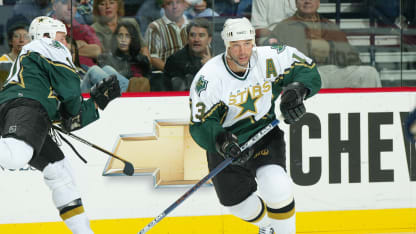He was a two-time Stanley Cup champion as a player, and now, twice a champion as a National Hockey League executive.
Three-time Olympian Bill Guerin was elected to the U.S. Hockey Hall of Fame and currently holds the dual posts of assistant GM of the Pittsburgh Penguins and general manager of their American Hockey League affiliate in Wilkes-Barre/Scranton.
The father of three girls and a boy signed a five-year deal with the Dallas Stars in the summer of 2002 and despite his short time here, he remains a popular personality with Stars fans.
Not surprisingly, Guerin continues to recall his time in Dallas with great fondness. We caught up with the native of Wilbraham, Massachusetts recently before his 25th Anniversary Reunion Night.
Stars great Guerin still has 'good spot in heart for Dallas'
The U.S. Hockey Hall of Famer spent three seasons with the team, becoming a fan-favorite

Scott Burnside: So, what is a typical week like for you?
Bill Guerin: A typical week? Ha. A typical week for me, I guess, it depends on what is going on it. It depends on if team is on road or at home. If the team is at home, then I tend to be here (in Pittsburgh) at least during the week. If they're on the road, I use that as an opportunity to get out and do some scouting. I'm the general manager of Wilkes-Barre, so I deal every day with roster moves down there; making sure everything is just kind of running smoothly -- talk with our coaches down there, with the president of our team. All the logistical stuff with call-ups and send-downs. I deal a lot with our player development staff and with our pro scouting staff. So, to answer your question, there's no blue print. You're not punching the clock from 9 to 5. It could be 9 to 8, it could be 7 to 12, it could be 12 to 12.
SB: You made a pretty much seamless transition from playing to working on the management side with the Penguins (Guerin played his final NHL game in the 2010 playoffs for Pittsburgh, although he attended training camp the following fall in Philadelphia before retiring). Was it easier than you thought it was going to be?
BG:Anytime you stop doing what you love, it's hard. And there's, I mean -- hey, look, flat out: it's hard to stop playing. It was hard and I know it's hard for everybody. I understand that. My biggest fear was sitting around thinking about playing and I couldn't do that. I wanted to get involved right away. Ray (former GM Ray Shero) made me take a couple of months off. And kind of around Christmastime, I started following (former player and Penguins executive at the time) Tom Fitzgerald around and they created the player development coach role for me and it was fantastic. It allowed me to see what went on in every department. They were just really open with me. I found out what coaching was like in Wilkes-Barre because I helped (former AHL head coach now head coach in New Jersey) John Hynes and Alain Nasreddine. I was in the amateur scouting meetings, I was in the pro meetings, I was at the draft, I was around the Penguins coaches. I got to see a lot in every single department. And with the player development, you get your feet wet in scouting as well. You create relationships with agents -- with college coaches, junior coaches. I think it's a great avenue for a former player just because it keeps you in there and you learn so much.
SB: Are you surprised that you've taken to it so well and had the success you've had in your new career?
BG: I love it. I love it. But it's not for everyone. I think that's the important thing in my mind, that's the important thing for a former player, to find what works for you. I've talked to guys. I've mentioned that the one thing that you do in this job is travel. It eats up a lot of your weekends. Some guys are, like, 'Okay, I'm fine with it.' Some guys are like, 'Ooh.' I found a home in Pittsburgh. I found a fit. It worked for me. I love doing the work; I love getting out to the rinks. I love being involved in the day-to-day operation. I just love it.
SB: That's pretty good to be able to move from something you loved doing for your whole life, playing the game, to then find something else that you love to do every day.
BG: I tell my kids this: You have to find a passion. Whatever it is, you have to have a passion. And that, well, it's like the old saying, I f you do something you love, you've never worked a day in life. That's what I feel I do. To go around to the rinks -- and you're working and you're scouting, but you run into guys you used to play with or against your old coaches, your old GMs. Hockey's a relationship business and I've been really, really fortunate to be around some great people .
SB: You signed with Dallas as a free agent at a time when a lot of teams were interested in you and you were a highly sought after player. What was it that attracted you to Dallas and how did that unfold?
BG:I was in a great spot. I was not offered a contract by my former employer (the Boston Bruins) and I had talked to a small handful of teams. But I remember Tom Hicks, Doug Armstrong (and) Dave Tippett came up to Boston and met with a few of us. I think they met with me, Scotty Young and Tony Amonte. The enthusiasm that they showed for signing me, the commitment that they were going to make to me and my family was incredible. When I broke it down and looked at the most important part, the hockey, we were stacked. For me, the opportunity to go there and be on a great team outweighed everything else and I jumped at it. It was awesome. I just loved it. It really was great. We go down there, we didn't know what to expect. We had never lived in Texas. We still miss it. We still have a good spot in our heart for Dallas. We made a lot of great friends. It's just such a fun place to live, it really is, and it was a great place to play.
SB: The reality is it didn't turn out way you wanted, getting bought out. There was no storybook ending here for you, does it surprise you that you still feel so positively about your experience in Dallas?
BG: I could look back and maybe drum up some negative things, but you know what, you can do that anywhere you played. And the one thing that I learned over the years is that there are good things and bad things about everywhere. You know what? It didn't work out for us as a team there. I think, individually, it could have gone better for me. But there are a lot of things that were great about it. We were a good team. My first year, I got injured. I was having a good year. And then, team-wise, we ran into the hottest goalie you could possibly run into in J.S. Giguere (with Anaheim). That was a severe disappointment. But you know what? The ownership and Doug Armstrong, they were all in. And when you're a player and you know that the ownership is all in, and the GM's doing whatever he can to make you guys a better team, you're in a good place. Dave Tippett's a great coach and he tried. It's just, hey, look, it just didn't work. And 29 other teams could say it that year or those three years. It just didn't work.
SB: So, do I have this right? The year after you left Dallas, the All-Star Game was in Dallas and you made the team and got a standing ovation.
BG:You are absolutely right. That was a big motivation to try and get in that game. I'm not kidding. But it was. I didn't expect that response. I was blown away. I was touched by that. It didn't go the way -- like you said, it was not a storybook ending. But to have the appreciation of the fan base there at that moment was -- that hit me hard. In a great way, it really did. It was amazing.
SB: You won two Stanley Cups as a player (one with New Jersey and one with Pittsburgh) and won two now as an executive with the Penguins. Is there a way to compare them or what it means to be on the ice when you win them in different ways?
BG: It's awesome and it is. It's different, but it doesn't mean it's less. When you're a player and you have the battle scars, and you have the marked up face and you need ice bags after games, that's what you're jealous of. Like you see the guys' faces and that's what you miss. But when you're on the management side, I could see (Pittsburgh GM) Jim Rutherford. He put that together. I looked across and I saw guys like Bryan Rust and Connor Sheary, Scott Wilson, Tom Khunhackl, Brian Dumoulin -- guys that I was the player development coach for. Going to see Bryan Rust at Notre Dame or dealing with these guys when they were in the minor league, and have them be Stanley Cup champions. And you know, guys in management, they sacrifice too. It was such a gratifying feeling. It's just different than as a player.
This story was not subject to approval of the National Hockey League or Dallas Stars Hockey Club. You can follow Scott on Twitter @OvertimeScottB, and listen to his Burnside Chats podcast here.


















